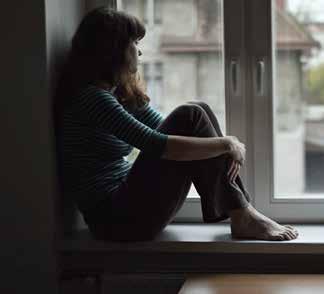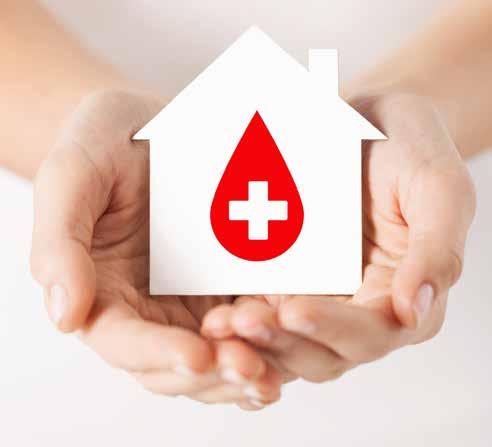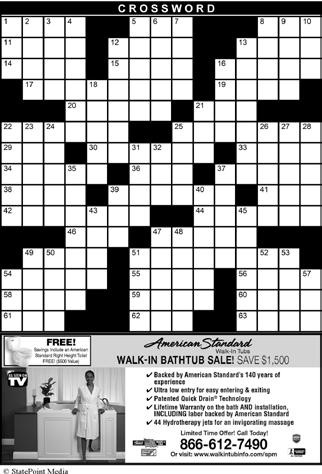
10 minute read
Community
STOP THE SPREAD OF COVID-19! LEARN HOW TO TAKE CARE OF YOURSELF AND OTHERS AT HOME.
WHAT ARE THE SYMPTOMS OF COVID-19? • The most common symptoms are fever, cough, sore throat and shortness of breath. Other symptoms include feeling achy, loss of taste or smell, headache, and diarrhea. • Most people with coronavirus disease 2019 (COVID-19) will have mild or moderate symptoms and can get better on their own.
Advertisement
WHO IS MOST AT RISK FOR SERIOUS ILLNESS? • People age 50 or older (people age 65 or older are at the highest risk) • People who have other health conditions, such as:
Lung disease Asthma Heart disease Obesity Diabetes Kidney disease Liver disease Cancer A weakened immune system
If you are sick with COVID-19 symptoms, assume you have it. When you are sick: • If you have trouble breathing, pain or pressure in your chest, are confused or cannot stay awake, or have bluish lips or face, call 911 immediately. • Call your doctor if you are age 50 or older or have a health condition that puts you at increased risk, or if you do not feel better after three days. • Always contact a doctor or go to the hospital if you have severe symptoms of COVID-19 or another serious health issue. • Do not leave your home except to get necessary medical care or essential food or supplies (if someone cannot get them for you). • If you must leave your home:
Avoid crowded places. Stay at least 6 feet from others. Cover your nose and mouth with a bandana, scarf or other face covering. Wash your hands before you go out, and use alcohol-based hand sanitizer while outside. • Household members can go out for essential work and needs but should monitor their health closely. If you or someone in your home is sick: • Create physical distance:
Do not have visitors. WHAT SHOULD I DO IF I GET SICK
WITH COVID-19 SYMPTOMS?
Stay at least 6 feet from others. Sleep head-to-toe if you share a bed with someone who is sick, or sleep on the couch. Keep people who are sick separate from those at risk for serious illness. • Cover up:
Cover your nose and mouth with a bandana, scarf or other face covering when you are within 6 feet of others.
Cover your cough or sneeze with a tissue or your inner elbow. • Keep it clean:
Throw tissues into the garbage immediately after use. Wash your hands often with soap for 20 seconds, especially after you cough or sneeze. Use alcohol-based hand sanitizer if you are unable to wash your hands. Frequently clean surfaces you touch, such as doorknobs, light switches, faucets, phones, keys and remote controls. Wash towels, sheets and clothes at the warmest possible setting with your usual detergent, and dry completely. Do not share eating utensils with others, and wash them after every use.
• If you have been sick, stay home until: You are fever-free for three days without Tylenol or other medication and It has been at least seven days since your symptoms started and
Your symptoms have improved • Reminder: New York is on PAUSE. This means that even if you have been sick, you should only leave your home for essential work or errands, or to exercise, while staying at least 6 feet from others. WHEN CAN I LEAVE MY HOME AFTER BEING SICK?
NEED HELP? • If you are having a medical emergency, call 911. • If you do not have a doctor but need one, call 844-NYC-4NYC (844-692-4692). New York City provides care, regardless of immigration status, insurance status or ability to pay. • For more information, call 311 or visit nyc.gov/coronavirus.
HARLEM COMMUNITY NEWSPAPERS HEALTH Newly Unemployed? Understanding Your Health Insurance Options
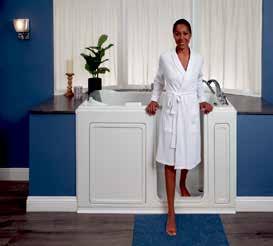
With millions of people nationwide filing for unemployment since the start of the COVID-19 pandemic, many individuals and families across the country are suddenly finding themselves without health insurance at a precarious time. Fortunately, new options may be able to help those on tight budgets.
“The sudden and unexpected loss of health insurance only compounds the stress caused by job loss amidst this unprecedented economic and public health crisis. However, unemployed individuals have more options for affordable health insurance than they did during past economic recessions thanks to provisions in the Affordable Care Act, along with actions recently taken by Congress and some states,” says American Medical Association (AMA) president, Patrice A. Harris, M.D.
Whether you recently lost your job-based health insurance or were uninsured before COVID-19 struck, the AMA, a longtime advocate for health insurance coverage for all Americans, is highlighting the following options: • Affordable Care Act (ACA) Marketplaces: Family and individual health plans can be bought in the health insurance marketplaces created by the ACA. Losing a job is a qualifying life event that allows unemployed individuals up to 60 days to enroll in a marketplace health plan before the close of a special enrollment period. Due to the COVID-19 pandemic, certain states have reopened enrollment periods when all consumers -- not only those who have experienced a job loss -- can enroll in marketplace health plans and potentially qualify for financial assistance to purchase these plans based on their income.
Subsidies available to eligible individuals through the health insurance marketplaces can help with premiums and out-of-pocket costs, making coverage more affordable. The Kaiser Family Foundation can help calculate an estimate of premiums and subsidies based on an individual’s income, age and family size. It will also estimate an individual’s eligibility for Medicaid. • Medicaid: While each state’s program has unique attributes for coverage, Medicaid can offer no- or low-cost coverage for those with the lowest incomes with limited cost-sharing requirements. Unlike the ACA marketplaces, there is no defined open enrollment period for Medicaid, and eligible people can sign up at any time. State eligibility requirements and income qualifications vary by state. Every state covers low-income children, pregnant women and people with disabilities, while 36 states and the District of Columbia have expanded Medicaid coverage so that adults with income up to 138 percent of the federal Discount applied at time of purchase. Terms and Conditions Apply. * Subject to 3rd party credit approval. Minimum monthly payments required. Receive a free American Standard Cadet Toilet with full installation of a Liberation Walk-In Bath, Liberation Shower, or Deluxe Shower. Offer valid only while supplies last. Limit one per household. Must be fi rst time purchaser. All offers subject to change prior to purchase. See www.AmericanStandardBathtubs.com for other restrictions and for licensing, warranty, and company information. * CSLB B982796; Suffolk NY:5543IH; NYC:HIC#2022748-DCA. Safety Tubs Co. LLC does not sell in Nassau NY, Westchester NY, Putnam NY, Rockland NY. ✓EXPERIENCE YOU CAN TRUST!
Only American Standard has OVER 140 years of experience and offers the Liberation Walk-In Bathtub. ✓SUPERIOR DESIGN!
Ultra low easy entry and exit design, wide door, built-in safety bar and textured oor provides a safer bathing experience. ✓PATENTED QUICK-DRAIN ®
TECHNOLOGY ✓LIFETIME WARRANTY!
The ONLY Lifetime Warranty on the bath AND installation, INCLUDING labor backed by American Standard. ✓44 HYDROTHERAPY JETS!
More than any other tub we’ve seen. WALK - IN BATHTUB SALE! SAVE $1,500
Lifetime Warranty! Finance Options Available * FREE!
An In-Home Evaluation Will Be Scheduled At Your Earliest Convenience
FREE!
Savings Include an American Standard Right Height Toilet FREE! ($500 Value)
855-419-3775 Or visit: www.walkintubinfo.com/harlem Limited Time Offer! Call Today!
Walk-In Tubs (Statepoint)
PHOTO SOURCE: (c) fizkes / iStock via Getty Images Plus
poverty level can qualify. • Beware Short-Term Plans: The AMA cautions patients to avoid shortterm limited duration plans whenever possible, especially during this pandemic. Short-term plans are designed to fill temporary gaps in health insurance when comprehensive coverage may not be an option. But it is important to understand that these plans offer very limited benefits and do not usually cover COVID-19 testing and treatment, preexisting medical conditions, mental health services, prescription drugs, and preventative and wellness care.
“Avoiding gaps in coverage should be a top priority for anyone who has recently lost their health insurance,” says Harris. “The COVID-19 pandemic has highlighted the importance of having meaningful health insurance coverage.”
COVID-19 initiatives from New York State Assemblyman Walter Mosley
As we enter week eight of the COVID-19 pandemic and economic shutdown, our city and state has been challenged in ways it has never been tested. The road ahead remains uncertain. With our essential workers, frontline personnel, and first responders still at risk, we cannot say thank you enough for what these women and men, along with their families, have sacrificed. Along with union labor, I cannot imagine where we would be as a city or state without their courage and professionalism during these trying times.
As we continue to expand upon our testing, tracing, and treatment protocols statewide -- it is equally important that we also recognize the secondary wave of important issues that are impacting our communities throughout our city and state. From the immediate need for rental assistance, to added social services, the secondary wave from this pandemic and how it will impact all of us will depend on two upcoming budget related matters.
The next federal stimulus package will have a significant impact on our state. From our state’s current budget, to our local municipalities -- the impact
Assemblymember Walter T. Mosley
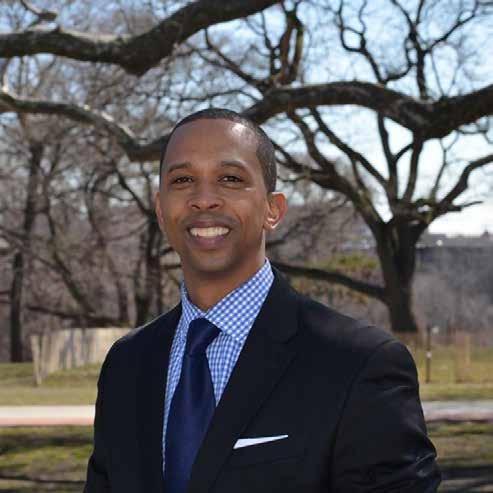
will be directly linked to what changes we make to our state budget and possible cuts that might be imposed going forward. Billions of dollars are at stake. As such, services and programs New Yorkers have come to expect will be determined in the coming days. Congress will look to provide a formula within the next federal package to be proportional to the number of infections per state. If that funding formula is implemented, we can anticipate that New York will get its fair share in federal aid.
There is no denying that we need to do more when it comes to our most vulnerable populations like our seniors, the incarcerated, and our NYCHA residents. The will to do better can only be outdone by what we actually do for our fellow New Yorkers on a daily basis.
From adding more testing sites, to providing the necessary mental healthcare services, we have to do more and expect more from less.
As such, here are some important contact information hotlines:
Find a Local Test
ing Site: 888-364- 3065
Paid Sick Leave
Benefits: 855-491- 2667
Tablet Hotline for
NYC Seniors: Call 311
Census Phone Survey: 884-330-2020
Likewise, we have been able to secure a new procedure to resolving State Department of Labor complaints for current and new unemployment applicants.
Last, but certainly not least, the matter of security as we look ahead cannot be taken lightly nor for granted. Whether its food security or housing instability, as legislators we must continue to propose and pass public policy that meets the demands of some of our most pressing needs. From thebeginning of this economic shutdown my office knew the instability in our housing stock would be at risk. Likewise, with the June 20th deadline for the end of the current eviction moratorium quickly approaching and fewer families being able to pay their rent, it is imperative that we work on and introduce legislation to address this ongoing housing problem.
With tenants across our state struggling and in need of immediate relief from their financial hardships, my office along with state agencies and housing advocates, sought to provide immediate relief by forgiving outstanding rent at the end of the eviction moratorium.
It is clear that to remain good stewards of the people and the state we must navigate these economic waters with caution.In doing so we must put the needs of the people first, understanding that the financial hardships and burdens are widespread and felt throughout the state -- from local tenants, undocumented residents, and owner occupied residents -- we must work together to discuss these collective needs if we are to come back from the burdens of this pandemic.
That’s why I have authored and introduced legislation to prohibit the rent guidelines board from increasing rents during a state disaster and a COVID-19 relief tax credit to renters and individual residential rental property owners with annual incomes between $25,000 and $75,000.
Even in the midst of apparent despair, our work as legislators in our districts or in Albany can never be far apart. Likewise, as neighbors and as a community we can’t ever be too far apart from one another. Even during this dark period in our state’s history, the light that comes from our goodness and our deeds will always prevail.
As always, my office is here to help you. If you have any questions about the information contained in this email or questions on any other matters, please let us know.

